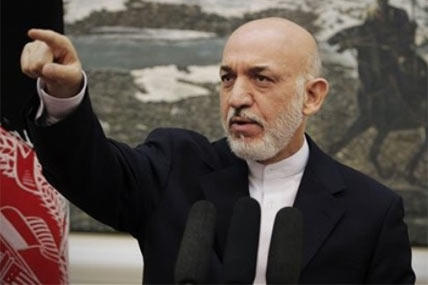President Barack Obama and Afghanistan President Hamid Karzai will not discuss on Friday how many U.S. troops will stay in Afghanistan after America completes its withdrawal in 2014.
White House officials told reporters on Tuesday the possibility remains that no American troops will be left behind after 2014.
"[Zero] would be an option we would consider," Deputy National Security Adviser for Strategic Communications Ben Rhodes said. The total U.S. force presence depends on how well U.S. and Afghanistan plans develop to secure and stabilize the war-torn country over the next 24 months, officials said.
"As Afghanistan moves into the lead, that enables us to reduce forces in the country," Rhodes said.
About 68,000 U.S. troops are deployed to Afghanistan, the same size force that was in place when Obama took office in early 2009 before he increased the number by 33,000. Those "surge" numbers redeployed in September.
Rhodes said that Friday's negotiations will focus on the transition of combat operations to Afghan forces, the U.S. withdrawal and reconciliation efforts with the Afghan Taliban. The two leaders will also discuss the bilateral security agreement governing authorities, privileges and immunity of Americans to Afghan law, he said.
Rhodes and Doug Lute, Deputy Assistant to the President and Coordinator for South Asia, said the administration wants to make sure Afghan forces have the training and equipment to stand on their own, and the political stability to prevent al-Qaida from retaking control of Afghanistan.
"The fact is we're most interested in having a partnership with Afghanistan," Rhodes said. "We're not going to be partners in combat after 2014."
Rhodes declined to offer numbers in regards to the size of the force presence.
"The President approaches [post-2014] not in terms of a certain number of troops in the country," Rhodes said, but what's needed "to accomplish the goals of keeping al-Qaida out and training and equipping Afghan security forces."
"There are many different ways to accomplish this, some may involve U.S. troops and some may not," he said.
The immunity issue could force U.S. diplomats to keep U.S. troops out of Afghanistan after 2014. U.S. leaders chose to keep U.S. troops out of Iraq after the withdrawal of combat troops because the Iraq government would not offer immunity to Iraq laws.
Without those immunities, "then there's no room for a follow-on U.S. military mission," Lute said.
Lute also said Obama and Karzai will discuss a "road map" for peace drafted by the Afghan government. He said Pakistan and the U.S. have been provided with the plan, which he called "a clear path" to a peaceful reconciliation.
"All these discussions always include regional dynamics," Lute said. "And obviously Afghanistan lives in a tough region, and its relationships and our relationships with Afghanistan's neighbors are always prime topics when the two presidents get together."





























